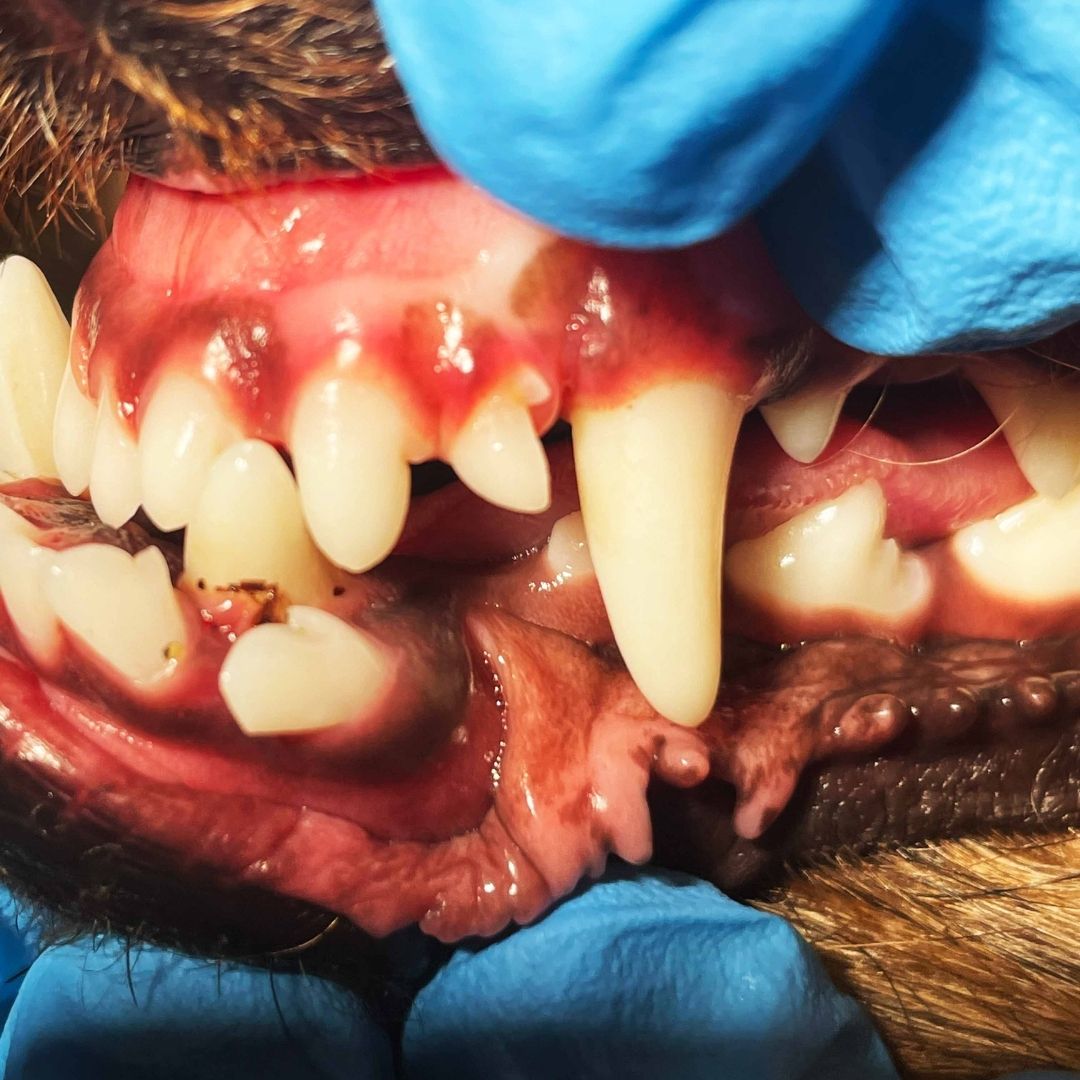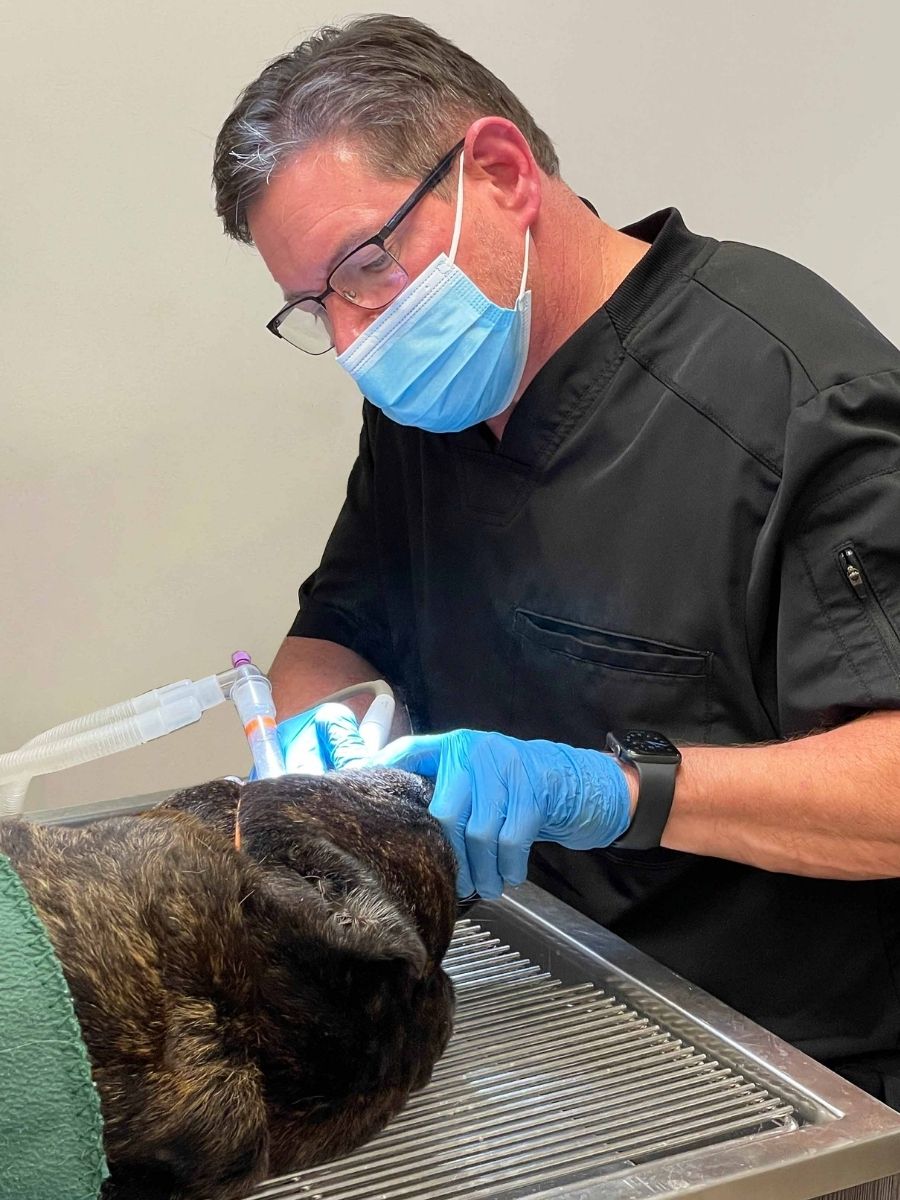Dental health is a crucial part of your pet’s overall health. Your pet’s teeth and gums should be checked at least once a year by a veterinarian to look for any early signs of dental issues.
1: What are some causes of dental problems in pets?
Pets can have many of the same dental problems as people, such as:
- Periodontal disease
- Broken teeth and roots
- Abscesses or infected teeth
- Cysts or tumors in the mouth
- Malocclusion, or misalignment of the teeth and jaw
- Broken (fractured) jaw
- Palate defects (such as cleft palate)

2: What is periodontal disease?
It is estimated that more than eighty-five percent (85%) of dogs over three years old suffer from periodontal disease, making it the most common disease affecting dogs. In cats, seventy percent (70%) aged five years and older suffer from this silent disease.
Periodontal disease is an infection of the tissues surrounding the tooth. It begins with plaque, tartar, and gingivitis. When left untreated, the painful infection can spread deeper into the tooth socket, destroying the bone and ultimately causing the tooth to fall out. Periodontal disease is treated by dental cleaning with x-rays.
Early detection and treatment are critical because periodontal disease doesn’t just affect your pet’s mouth. Advanced periodontal disease can cause severe pain and other problems affecting the kidneys, liver, and heart.
3: How can plaque and tartar be prevented?
The best way to prevent tartar build-up is through daily tooth brushing using a toothpaste that is specifically formulated for pets. Special chew toys, treats, and some pet foods have been specifically formulated to help remove plaque. Water additives are also available. Look for the Veterinary Oral Health Council (VOHC) logo on pet dental products or visit their website for a list of products that are proven to reduce the accumulation of plaque and/or tartar.
4: How can I tell if my pet is suffering from dental disease?
Routine veterinary check-ups are the best way to detect dental disease. Have your pet’s teeth checked if you observe any of the following problems:
- Bad breath
- Broken or loose teeth
- Extra teeth or retained baby teeth
- Teeth that are discolored or covered in tartar
- Abnormal chewing, drooling, or dropping food from the mouth
- Reduced appetite or refusal to eat
- Swelling, pain, or bleeding in or around the mouth
- Behavior changes
Always use caution when evaluating your pet’s mouth, because any animal in pain may bite.
5: What is involved in a routine dental cleaning?
A routine dental cleaning involves a thorough dental examination followed by a dental scaling to remove the plaque and tartar from all tooth surfaces. Your pet’s teeth will then be polished to remove microscopic scratches. Special applications such as fluoride, antibiotic preparations, and cleaning compounds may be used depending on your pet’s specific needs.
Your pet will be under anesthesia for their routine dental cleaning. This makes it possible to safely and effectively perform the dental procedures and take radiographs (x-rays). X-Rays are critical to evaluate the health of the jaw and the tooth roots below the gumline. Your veterinarian will also perform pre-anesthetic blood tests and discuss any specific recommendations for your pet.

6: Who should perform veterinary dentistry?
Veterinary dentistry should be performed by a veterinarian. Complex dental procedures should be performed by a Fellow, Academy of Veterinary Dentistry (FAVD) or a board-certified veterinary dentist (Diplomate, American Veterinary Dental College, AVDC). Veterinary Technicians may perform certain dental procedures under the supervision of a veterinarian.
Dental health care is crucial for the longevity of your pet. Please remember: pets have teeth too! And they need our help to provide the necessary home care and professional dental health care from your veterinarian.
Steve Capron, DVM, FAVD
Pet Paradise Veterinary Care



